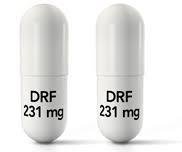Diroximel Fumarate Dosage
Medically reviewed by Drugs.com. Last updated on Nov 20, 2024.
Applies to the following strengths: 231 mg
Usual Adult Dose for:
Additional dosage information:
Usual Adult Dose for Multiple Sclerosis
Initial dose: 231 mg orally twice a day for 7 days
Maintenance dose: 462 mg orally twice a day
Use: For the treatment of relapsing forms of multiple sclerosis, to include clinically isolated syndrome, relapsing-remitting disease, and active secondary progressive disease
Renal Dose Adjustments
Mild renal dysfunction: No adjustment recommended
Moderate or severe renal dysfunction: Not recommended
Comments:
- No data are available on long-term use in patients with moderate or severe renal dysfunction.
Liver Dose Adjustments
Liver dysfunction: No adjustment recommended
Comments:
- This drug has not been studied in patients with liver dysfunction; however, no effect on exposure to monomethyl fumarate (active metabolite) would be expected.
Dose Adjustments
Patients who do not tolerate the maintenance dose: Temporary dose reductions to 231 mg orally twice a day may be considered.
- The recommended dose of 462 mg orally twice a day should be resumed within 4 weeks.
- Discontinuation of this drug should be considered for patients unable to tolerate return to the maintenance dose.
Patients with herpes zoster or other serious infections: Withholding therapy until the infection has resolved should be considered.
Patients with lymphocyte counts less than 0.5 x 10(9) cells/L persisting for more than 6 months: Interruption of therapy should be considered.
- Lymphocyte counts should be monitored until recovery if this drug is discontinued or interrupted due to lymphopenia.
At first sign/symptom suggestive of progressive multifocal leukoencephalopathy (PML): This drug should be withheld and appropriate diagnostic evaluation should be performed.
Precautions
CONTRAINDICATIONS:
- Known hypersensitivity to the active component, any of the ingredients, or dimethyl fumarate
- Taking dimethyl fumarate
Safety and efficacy have not been established in patients younger than 18 years.
Consult WARNINGS section for additional precautions.
Dialysis
Data not available
Other Comments
Administration advice:
- Before therapy, obtain a CBC (including lymphocyte count) and serum aminotransferase, alkaline phosphatase, and total bilirubin levels.
- Swallow capsules whole and intact; do not crush or chew and do not sprinkle the capsule contents on food.
- Administration with food may reduce the incidence of flushing.
- If administered with food, avoid a high-fat, high-calorie meal/snack; the meal/snack should contain no more than 700 calories and no more than 30 g fat.
- Avoid coadministration with alcohol.
- Administration of non-enteric coated aspirin (up to a 325 mg dose) 30 minutes before administration of this drug may reduce the incidence and severity of flushing.
Storage requirements:
Store at 20C to 25C (68F to 77F); excursions permitted to 15C to 30C (59F to 86F).
Monitoring:
- Enzyme investigations: Alkaline phosphatase (before and during therapy, as clinically indicated)
- Hematologic: CBC including lymphocyte count (before therapy, 6 months after starting therapy, and then every 6 to 12 months thereafter, as clinically indicated)
- Hepatic: Serum aminotransferase and total bilirubin levels (before and during therapy, as clinically indicated)
Patient advice:
- Read the US FDA-approved patient labeling (Patient Information).
- Take this drug as instructed; do not take it with alcohol.
- Discontinue this drug and seek immediate medical care if signs/symptoms of anaphylaxis or angioedema occur.
- It is important to contact your health care provider if any symptoms suggestive of PML develop; typical symptoms associated with PML are diverse, progress over days to weeks, and include progressive weakness on 1 side of the body or clumsiness of limbs, disturbance of vision, and changes in thinking, memory, and orientation leading to confusion and personality changes.
- It is important to contact your physician if any signs/symptoms associated with herpes zoster or other serious opportunistic infections develop.
- Promptly report any symptoms that may indicate liver injury (including fatigue, anorexia, right upper abdominal discomfort, dark urine, jaundice) to your health care provider.
- Contact health care provider if persistent and/or severe flushing or gastrointestinal reactions occur; taking this drug with food (avoid high-fat, high-calorie meal/snack) or taking a non-enteric coated aspirin before taking this drug may help with flushing.
- Inform health care provider if you are pregnant or plan to become pregnant during therapy.
Frequently asked questions
More about diroximel fumarate
- Check interactions
- Compare alternatives
- Reviews (8)
- Side effects
- During pregnancy
- Drug class: selective immunosuppressants
- Breastfeeding
- En español
Patient resources
Other brands
Professional resources
Other brands
Related treatment guides
Further information
Always consult your healthcare provider to ensure the information displayed on this page applies to your personal circumstances.


